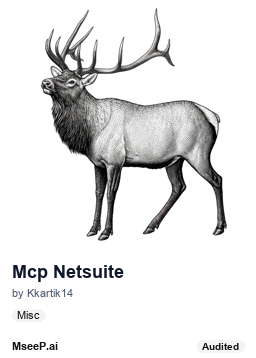About
The MCP Netsuite server provides a lightweight, mock implementation of Oracle NetSuite APIs for testing and development. It allows Model Context Protocol clients to simulate NetSuite interactions without needing a live NetSuite environment.
Capabilities

Overview
The MCP‑Netsuite server is a specialized Model Context Protocol (MCP) implementation that bridges AI assistants with Oracle NetSuite, one of the leading cloud ERP platforms. By exposing a set of well‑defined resources and tools over MCP, it allows conversational agents such as Claude to perform real‑time data queries, create and update records, and retrieve analytics directly from a NetSuite tenant. This eliminates the need for developers to write custom API wrappers or handle authentication flows manually, enabling rapid integration of business data into AI‑driven workflows.
Why It Matters
NetSuite’s REST and SOAP APIs are powerful but can be verbose and difficult to navigate, especially when integrating with a language model that expects simple prompt–response interactions. MCP‑Netsuite abstracts these complexities behind a clean, declarative interface: each NetSuite entity (e.g., Customer, Sales Order, Inventory) is represented as a resource with CRUD operations exposed as MCP tools. This makes it straightforward for an AI assistant to ask, “Show me the top five customers by revenue,” and receive a structured response without any additional plumbing. For developers, this translates to faster prototyping, fewer bugs, and a lower barrier to entry for adding ERP functionality to AI applications.
Key Features
- Resource‑oriented API – Each NetSuite object type is mapped to an MCP resource, providing intuitive operations such as , , , and .
- Tool‑based interactions – The server registers a set of tools that can be invoked by the AI client, allowing dynamic data manipulation without hard‑coding requests.
- Authentication abstraction – OAuth 2.0 or token‑based credentials are handled internally, so the AI assistant only needs to supply a simple API key or session token.
- Structured responses – Data returned from NetSuite is formatted as JSON objects that can be directly consumed by downstream processing or visualisation tools.
- Extensibility – New NetSuite record types can be added by extending the server’s schema, making it future‑proof as the ERP evolves.
Real‑World Use Cases
- Sales Analytics – An AI assistant can pull real‑time sales dashboards, forecast revenue, or identify underperforming regions.
- Order Fulfilment Automation – By creating or updating sales orders, the assistant can trigger fulfilment workflows automatically.
- Customer Support – Agents can retrieve customer profiles, open cases, or payment history on the fly to provide personalized support.
- Inventory Management – The assistant can query stock levels, generate reorder alerts, or adjust quantities across multiple warehouses.
Integration with AI Workflows
Developers embed MCP‑Netsuite into their existing MCP infrastructure by registering the server’s endpoint with an AI assistant. The assistant’s prompt engine can then call NetSuite tools as part of a larger chain: for example, a user asks for the latest quarterly revenue, the assistant calls with appropriate filters, processes the data, and presents a concise summary. Because MCP follows a standardized contract, this interaction can be composed with other tools—such as data visualisation or natural language generation—without custom glue code.
Standout Advantages
- Zero‑code API consumption – Developers can integrate NetSuite data without writing custom SDKs.
- Consistent interface across tenants – Whether you’re on a sandbox or production environment, the same MCP calls work.
- Security‑first design – Credentials are never exposed to the AI model; only encrypted tokens are exchanged.
- Scalable architecture – Built on top of a lightweight Python framework, the server can handle high‑volume queries typical in enterprise settings.
In summary, MCP‑Netsuite turns a complex ERP system into an accessible, AI‑friendly data source, enabling developers to harness NetSuite’s capabilities in conversational and automated workflows with minimal effort.
Related Servers
MindsDB MCP Server
Unified AI-driven data query across all sources
Homebrew Legacy Server
Legacy Homebrew repository split into core formulae and package manager
Daytona
Secure, elastic sandbox infrastructure for AI code execution
SafeLine WAF Server
Secure your web apps with a self‑hosted reverse‑proxy firewall
mediar-ai/screenpipe
MCP Server: mediar-ai/screenpipe
Skyvern
MCP Server: Skyvern
Weekly Views
Server Health
Information
Explore More Servers
RAG Local Memory Server
Semantic text storage and retrieval with Ollama embeddings
PDF Reader MCP Server
Securely read and extract text, metadata, and page counts from PDFs
Jewish Library MCP Server
Search Jewish texts with advanced full-text queries via Model Context Protocol.
Clever Cloud Documentation MCP Server
Fast, modular API for Clever Cloud docs
Mcp Server Moke Gongwen
AI‑driven official document creation for government and corporate use
Octagon MCP Server
AI‑powered market intelligence for financial research